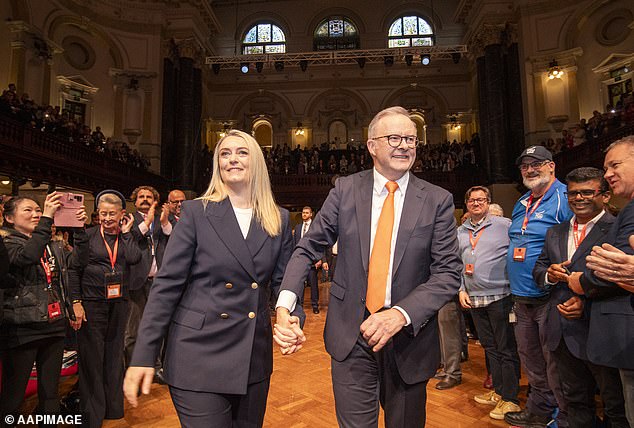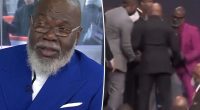Anthony Albanese has attempted to smooth things over with Donald Trump after the leaders clashed over US tariffs.
The relationship between the pair has been fractious since the Prime Minister failed to get the US President on the phone to secure an exemption to an increase of steel and aluminium tariffs last month.
Mr Albanese has said he would welcome Trump to Australia and that he is ‘absolutely’ planning to make Washington DC one of his first international trips if re-elected in May.
‘I have discussed with the president going to the US and I expect that certainly will be very early on in the term,’ he told ABC’s Afternoon Briefing.
‘I have also invited the President to Australia.’
However, it remains unclear whether Trump will make a reciprocal visit to Australia, which would be his first trip Down Under as President.
‘He did not come in his first term as president but American presidents will always be welcome here as other international visitors,’ Mr Albanese said.
‘We are likely to host the Quad meeting next year and that will see the Quad leaders – the US, Japan and India – visit Australia.’

Anthony Albanese (pictured with fiancee Jodie Haydon) insists his government has been negotiating in ‘good faith’ with the Trump administration, despite previous clashes over tariffs
With threats of US tariffs being threatened across Australian industries, Mr Albanese’s approach to the US President remained a sticking point during his post-Budget media rounds on Wednesday.
The Labor government raised defence spending to 2.2 per cent of GDP in the Budget – well short of the three per cent of GDP that the Trump administration has demanded of Australia.
Mr Albanese was asked by Sky News host Peter Stefanovic on Wednesday whether he risked raising the ire of his US counterpart with the funding.
‘I find it extraordinary that you refer to another nation about what people want,’ the Prime Minister replied.
‘What we want… is an Australian defence policy consistent with the Defence Strategic Review that we’ve put forward and the additional investment that we have put forward from the one that we inherited.’
Stefanovic then asked whether the Prime Minister was hopeful about Trump’s suggestion on Tuesday that he might walk back some tariff threats.
‘We’re continuing to negotiate in good faith with the US Administration, make representations,’ Mr Albanese said
‘That’s what responsible governments do.

US President Donald Trump (pictured) refused to offer Australia an exemption to his hefty 25 per cent steel and aluminium tariffs
Mr Albanese congratulated Trump on the phone after his November election win and spoke to him again in February – to argue Australia’s case to be exempt from trade tariffs, which Trump said he would give ‘great consideration’.
But it was revealed on March 12, Mr Albanese repeatedly tried to phone Trump directly ahead of the tariff announcement but the President did not answer his calls.
It’s understood Mr Albanese isn’t closer to securing another phone call with Trump.
The Trump administration is expected to announce its next round of sector-specific tariffs next week however the President has hinted that he ‘may give a lot of countries breaks’
Mr Albanese vowed to continue to ‘strongly’ engage with the US ‘through officials and through the representations’.
‘The important fact is what I’m looking for is an outcome, and what happens between leaders is that when things are sorted out by officials, then leaders have discussions,’ he told the ABC.
In the last week, President Trump has threatened tariffs on Australian wine as well as faced pressure from ‘Big Pharma’ over Australia’s Pharmaceutical Benefits Scheme.
Regarding the latter, American drug companies wrote to Trump’s trade boss, complaining that Australia’s PBS was ‘an egregious and discriminatory program which cuts prices and blocks American exporters’.

Prescription medicines could be the latest to impacted by US trade tariffs (stock image)
But, on Wednesday, the head of one of America’s largest medicine companies said he did not back economic constraints on Australian pharmaceuticals.
‘We do not support tariffs on medications anywhere, and we certainly wouldn’t be excited to see a policy like that,’ Eli Lilly chief executive David Ricks told ABC’s 7.30 program.
New US tariffs on Australian agricultural exports are set to come into effect on April 1, alongside new import taxes on Australian pharmaceutical exports unless an exemption is secured.
Unlike 2018, the Trump Administration has overlooked how the US has had a trade surplus with Australia dating back to 1952, where Australia bought more goods and services from the United States than it bought from us.








